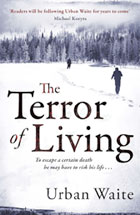Sidestepping the industry circus and downplaying his own achievements, Urban Waite isn’t your typical thriller writer, and his debut, The Terror of Living, isn’t your typical crime novel, as Dan Coxon finds out. Portrait by Sean Hunter

Crossing into similar territory to Cormac McCarthy’s No Country For Old Men, The Terror of Living offers more than just plot twists and cliff-hangers–although there plenty of those. It also explores the lengths that people will go to when thrust into unfamiliar circumstances, and the unlikely heroism that can emerge from pain and suffering. If it’s starting to sound more like a literary novel than a genre thriller, that’s no coincidence–The Terror of Living is one of those rare books that transcends its genre with every page. Stephen King recently called it “one of those books you start at one in the afternoon and put down, winded, after midnight”.
Its author isn’t exactly what you’d expect, either. For a young man who’s written about organized crime, shootouts and extreme physical torture, Urban Waite is surprisingly laid back and amiable. You’d never guess that his calm, smiling exterior hides the gloomy depths that he sometimes reveals on the page. Currently living in Seattle, the setting for The Terror of Living, Waite has given the city–and the entire Pacific Northwest–a new voice for its dark places and hidden secrets.
Given that The Terror of Living is your debut, can you tell us a little about how you got to this point? What path led you to publication?
For about a third of my life I’ve been working to become a writer. I never thought it would turn out the way it has. I never thought I’d have a novel, or even a job that centred on putting words to paper. It was always just a hope, a sort of dream to aspire to. For the most part I really did think that my life would continue the way it had for so many years, working nights to pay my mortgage, while keeping up my hobby of writing during the day.
A few years ago that all changed. I’d been out of school for several years when things just started to click. The stories I wrote before heading off to work were starting to get picked up in small literary publications. As a result I started receiving summer fellowships, grants, and residencies, while the publications started to become larger and larger. All this attention soon led me to an agent. And while I was still so engrossed in publishing stories, I didn’t see that the opportunity to write a book had simply appeared as if from nowhere.
Perhaps that’s just how blinded I was at the time, not even able to see that everything I had been doing, publishing short stories, taking these fellowships and residencies, had led me to the perfect place. Where everything I needed to strike out, as an author, was right there in front of me. I never thought I’d publish a novel. The idea seemed too bold, but there it was in front of me, an opportunity to do just that.
Did you set out to write a crime thriller when you started The Terror of Living? Or did the characters lead you in that direction?
I started out with the character of Phil Hunt. At the time there was a lot I didn’t know about him that I wanted to know, while also there was a lot that I knew already. He was an ex con, released twenty years before, and in those twenty years he’d never really forgiven himself for the crimes he committed. In this way, as I was writing out his first few scenes, I was very much interested in trying to understand why a man like him was working such a ruinous living in order to get by.
Part of what I loved about writing Terror, was that as I went on I began to understand the characters better, the situations they inhabited and the circumstances that had brought them there. They opened up for me, revealing more and more as the pages went by. In this way, and with characters like these, I found much of what I was writing about did have to do with crime. Though I certainly didn’t intend to write a crime thriller, the characters began to lead me in that direction. The truth of it was that as I got deeper into the novel, the more I enjoyed what I was writing.
I know The Terror of Living has been published in several countries, and some seem to treat it as a genre crime novel, while others have given it a more literary treatment. How do you feel about the industry’s need to divide their ‘product’ into genres like this? Is there a point when a crime novel becomes so good that it transcends its genre, and becomes a literary work?
I really try not to pay much attention to things like this. I don’t really care all that much if my novels are placed in the genre category or the literary category. All I care about is if people will read them and, if they do, what their reactions to my work will be. I put my all into everything I do and I hope that comes across whether I’m waiting tables, writing books, or building a deck. Good writing is just good writing and it doesn’t matter what genre it comes in.

The title strikes me as interesting too. It perfectly conveys the thriller elements of the story, but at the same time it avoids the clichés, nursery rhymes and cheap puns of most crime fiction. Was this a conscious decision on your part?
Thanks for the compliment about the title. Sometimes I love it; sometimes I think I just went overboard. I don’t mean to throw myself under the bus here, but I also want to tell you that it was a very tough decision to go ahead with The Terror of Living as the title. At the time I had about 320 pages or so and I needed to present the manuscript to my agent. I didn’t have a title and I didn’t want to send him a nameless manuscript. While I felt the story and the characters within were well polished, I also felt I needed to present the novel in as finished a way as I possibly could.
The title, The Terror of Living, was a mix of a few things. It needed, at least for me, to be something that would link all the characters within. It needed to be strong and to infer the inherent danger of the lifestyles I was trying to convey. It also needed to be something that would catch the attention of a prospective reader, as the novel sat facing out at them from the shelf.
It was about a week or so before I was due to present the manuscript to my agent when by chance I happened to go to a poetry lecture. I was sitting in the audience listening as the speaker began to talk about the pain of the terminally ill, especially those that would die young. I listened, hanging on every word, wondering what I might have done in a similar situation. How I would react if someone were to tell me something like this, to give me the news that I would die of a disease that could not be averted. This moment haunted me for a time, and though I don’t like to dwell on it too much, it certainly stuck with me. Of course the thought that we all die is always there, it was the suddenness of that lecture and the ideas it stirred in me which truly led me to my title. Every character in The Terror of Living was running from that same inevitable problem. One we simply cannot outrun.
I want to ask you about your influences, as it seems that they’d be an unusual mix for someone who’s been published as a genre writer, but I don’t want to resort to the typical “which writers influenced you” question. So… which five people would you want to invite to a dinner party? Living or dead, writers or otherwise, the choice is yours.
I feel like I’m going to disappoint you on this one. I doubt very much there would be a single writer at this dinner party. The people I write about are not writers but people who usually are working some sort of blue-collar job, living pay check to pay check. Those are the types of people who influence what I write. And while I certainly learn a great deal from the books I read, I learn so much more from sitting back and having a conversation with someone about a subject I know nothing about.
I know you’ve been touring a lot with The Terror of Living. How daunting is this for a debut novelist? And how relevant is it in this age of blogging and online interviews?
Most of the promotional process I really don’t understand. There are authors who live for this sort of thing, for touring and shaking hands and telling jokes. Sometimes I wonder if those guys, the ones that almost seem like politicians, are even in the business of writing.
I guess what I mean to say is that I’m no socialite. I like having a beer every once in a while or telling some stories, but the whole business side of things is something I never even considered when writing Terror. The months leading up to publication and the touring that followed seemed more to me like work than anything I’d ever done before. It put me outside of what I was interested in, which in my case was writing.
I don’t mean to be so blunt about the business, but I do think that writers are artists and making art a commodity becomes tricky. It’s the reason why people like me have agents and publicists and people who know what they’re doing. Whose jobs centre on helping bungling shut-ins like myself get back to doing what we love.
To make a long answer short here, I don’t have a clue what I’m doing when it comes to touring, or blogging, or interviewing. I just try to make it up as I go along, and in that way it’s somewhat like writing. I’m just trying to make it up as I go, all the while hoping it all turns out okay.
Any crazy stories from your time on the road, promoting the book? Or has it all been cheap hotel rooms and early nights?
In Boston I worked in a restaurant waiting tables. I did it for five years and a few months after I left the restaurant went under. All of those people I worked with lost their jobs and a lot of them moved, some to other restaurants, some went back to school, or others still decided to go on and move into something else. Now, in every city I turn up in, there is an old friend I used to work with waiting to take me out for drinks, show me the city, and catch up.
A lot of them can’t believe this is what I do for a living now. Writing was always kind of a hobby, it was something I did with my alone time before I went to work. It wasn’t exactly who I was. I’d say it would be hard to define me by it. And so when I go to these cities on tour, I do my reading, I talk about books for a little, then I get back to life as I know it. A life where there aren’t readings or book discussions. There’s just a few old friends, a few drinks, and maybe some food. Pretty simple, but it seems to work out every time.
